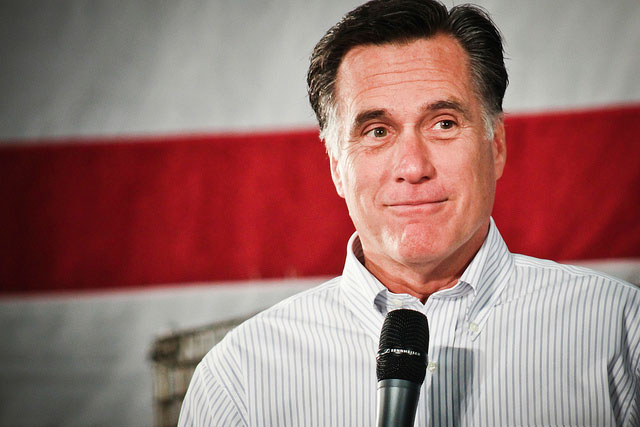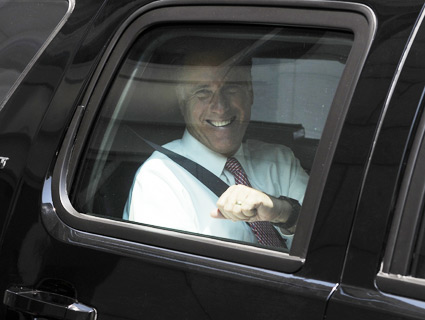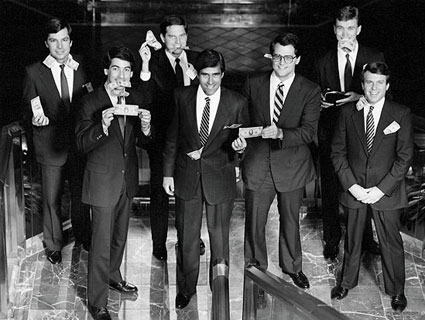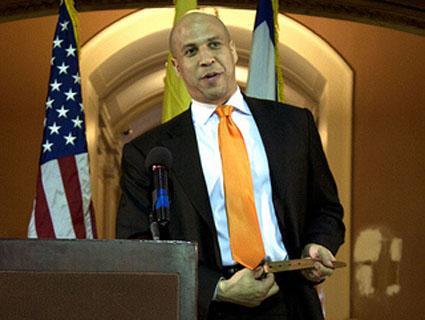
<a href="http://www.flickr.com/photos/davelawrence8/6791949310/" target="_blank">davelawrence8</a>/Flickr
The battle over Mitt Romney’s role at Bain and whether he was actually running the company after he claims to have left continues. Here’s what we know about the GOP presidential candidate’s involvement with the private equity firm:
Romney claims he left Bain in 1999.
- In his 2011 federal financial disclosure documents, Romney asserted that he left Bain in 1999 to run the Olympics and “had not been involved in the operations of any Bain Capital Entity in any way” since then.
- Bain released a statement to Politico saying that Romney’s story is true:
Mitt Romney left Bain Capital in February 1999 to run the Olympics and has had absolutely no involvement with the management or investment activities of the firm or with any of its portfolio companies since the day of his departure. Due to the sudden nature of Mr. Romney’s departure, he remained the sole stockholder for a time while formal ownership was being documented and transferred to the group of partners who took over management of the firm in 1999. Accordingly, Mr. Romney was reported in various capacities on SEC filings during this period.”
Official documents and other sources contradict Romney and Bain’s account.
Among them:
- Six SEC filings announcing Bain’s acquisition of other companies (collected here by the Washington Post‘s Glenn Kessler) that are signed by Mitt Romney.
- Those SEC filings, among them those first highlighted by my Mother Jones colleague David Corn and Talking Points Memo‘s Josh Marshall, list Romney’s “principal occupation” as “managing director of Bain, Inc,” as well as “chairman” and “chief executive officer.”
- As David reported on July 2, a press release issued on Bain’s behalf in 1999 describes Romney as the CEO of Bain and says he’s on a “a part-time leave of absence to head the Salt Lake City Olympic Committee.”
- Sworn testimony uncovered by Huffington Post‘s Ryan Grim and Jason Cherkis in which Romney states that “[T]here were a number of social trips and business trips that brought me back to Massachusetts, board meetings, Thanksgiving and so forth,” after 1999 and before 2003. Cherkis and Grim report that during this time, Romney continued to sit on the boards of Staples and LifeLike, a doll-making company—firms that Bain had invested in.
- As Grim and Cherkis reported, Romney’s lawyer said in 2002 that Romney’s “private and public ties to the Commonwealth of Massachusetts” continued “unabated” during his time running the Olympics.
- Romney told the Globe in 1999 that he would “stay on as a part-timer with Bain, providing input on investment and key personnel decisions.” As Slate‘s Dave Weigel points out, this article was cited in an email the Romney campaign sent out to rebut claims that Romney remained involved with Bain after 1999.
- News reports from during Romney’s 2002 run for governor refer to his affiliation with Bain during the 1999-2002 period as a “leave of absence,” not a full departure. As Politicker reported Friday, Romney retained a “very active role” with Bain during a previous leave of absence, when he ran for Senate in 1994.
So where does that leave us?
- Bain and Romney’s claim that he had “absolutely no involvement with the management or investment activities of the firm or any of its portfolio companies” is deeply implausible, given the SEC filings and Romney’s role on the boards of LifeLike and Staples. Lifelike, in particular, was a Bain portfolio company by any definition, and Romney was on its board—perhaps a passive management role, but indisputably a management role. As Brad DeLong writes, “It would be very unusual for somebody to have the titles of not just ‘CEO’ but ‘President,’ ‘Chairman of the Board’ and be ‘sole stockholder’ and to have no responsibilities whatsoever.” As a factual matter, Romney’s claim of zero involvement is contradicted by what we currently know.
- That said, none of the documents uncovered so far disprove Romney’s claim that he had no direct, day-to-day managerial role at Bain after February 1999. The Romney campaign seems to believe that inoculates the candidate from responsibility for Bain’s investment decisions during that time, despite the fact that Romney continued as CEO, president, and chairman of the board and benefited financially from Bain’s investments.
- But even if Romney wasn’t involved in Bain after 1999 (a claim contradicted by the documentary evidence), he’s still not off the hook for outsourcing. As my Mother Jones colleague David Corn has reported, there’s at least one example of Bain investing in outsourcing prior to the date Romney says he left.
Although the Obama campaign’s initial claims about Romney’s personally deciding to invest in outsourcing post-1999 were misleading, the Obama camp has shifted from accusing Romney of being directly responsible for deals that moved jobs overseas to accusing Romney of profiting from such deals, which is beyond dispute.
As Talking Points Memo‘s Brian Beutler wrote on Thursday, “For Romney to be truly off the hook politically for the stuff Bain was doing, he’d have to claim not lack of control, but lack of knowledge.” It’s hard to believe that Romney didn’t know what was going on at a company where he was the president, CEO, chairman of the board, and owner.
UPDATE: In an interview with local DC ABC affiliate WJLA, President Barack Obama says Romney should have to answer questions about his tenure at Bain:
Ultimately Mr. Romney, I think, is going to have to answer those questions, because if he aspires to being president one of the things you learn is, you are ultimately responsible for the conduct of your operations, but again that’s probably a question that he’s going to have to answer and I think that’s a legitimate part of the campaign.
Now, my understanding is that Mr. Romney attested to the SEC, multiple times, that he was the chairman, CEO and president of Bain Capital and I think most Americans figure if you are the chairman, CEO and president of a company that you are responsible for what that company does.












